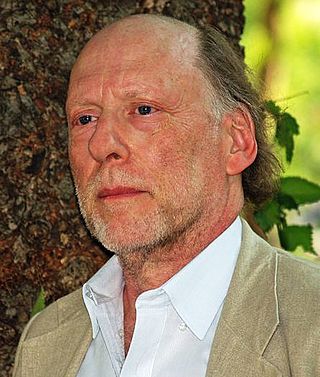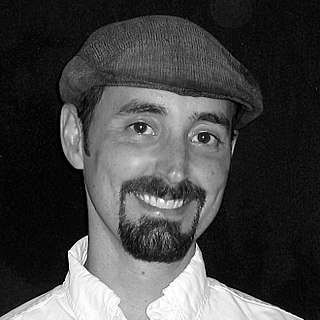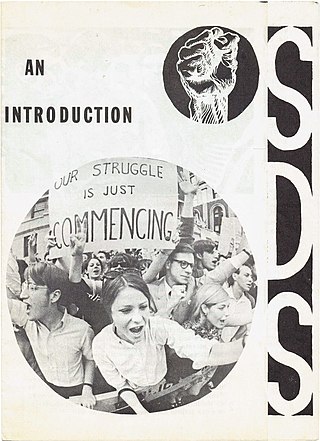
A sweatshop or sweat factory is a crowded workplace with very poor or illegal working conditions. The manual workers are poorly paid, work long hours, and experience poor working conditions. Some illegal working conditions include poor ventilation, little to no breaks, inadequate work space, insufficient lighting, or uncomfortably or dangerously high or low temperatures. The work may be difficult, tiresome, dangerous, climatically challenging, or underpaid. Workers in sweatshops may work long hours with unfair wages, regardless of laws mandating overtime pay or a minimum wage; child labor laws may also be violated. Women make up 85 to 90% of sweatshop workers and may be forced by employers to take birth control and routine pregnancy tests to avoid supporting maternity leave or providing health benefits.
The Port Huron Statement is a 1962 political manifesto of the American student activist movement Students for a Democratic Society (SDS). It was written by SDS members, and completed on June 15, 1962, at a United Auto Workers (UAW) retreat outside of Port Huron, Michigan, for the group's first national convention. Under Walter Reuther's leadership, the UAW paid for a range of expenses for the 1962 convention, including use of the UAW summer retreat in Port Huron.

Charles Horton Cooley was an American sociologist. He was the son of Michigan Supreme Court Judge Thomas M. Cooley. He studied and went on to teach economics and sociology at the University of Michigan. He was a founding member of the American Sociological Association in 1905 and became its eighth president in 1918. He is perhaps best known for his concept of the looking-glass self, which is the concept that a person's self grows out of society's interpersonal interactions and the perceptions of others. Cooley's health began to deteriorate in 1928. He was diagnosed with an unidentified form of cancer in March 1929 and died two months later.

Todd Alan Gitlin was an American sociologist, political activist and writer, novelist, and cultural commentator. He wrote about the mass media, politics, intellectual life and the arts, for both popular and scholarly publications.

Robert Alan Haber is an American activist. In 1960 he was elected the first president of the now-defunct Students for a Democratic Society, a left-wing student activist organization. FBI files at the time indicated his official title as Field Secretary. Described variously at the time as "Ann Arbor's resident radical" and "reticent visionary", Haber organized a human rights conference in April of that year which "marked the debut of SDS" and invited four organizers of the 1960 NAACP sit-ins against segregated lunch counters in Greensboro, North Carolina.

Andrew Ross, a Scottish-born social activist and analyst, is Professor of Social and Cultural Analysis at New York University (NYU). He has authored and edited numerous books, and written for The New York Times, The Guardian, The Nation, Newsweek, and Al Jazeera. Much of his writing focuses on labor, the urban environment, and the organisation of work, from the Western world of business and high-technology to conditions of offshore labour in the Global South. Making use of social theory as well as ethnography, his writing questions the human and environmental cost of economic growth.

Carl Preston Oglesby was an American writer, academic, and political activist. He was the President of the leftist student organization Students for a Democratic Society (SDS) from 1965 to 1966.
The Institute for Global Labour and Human Rights, formerly known as the National Labor Committee, was a non-profit, non-governmental organization (NGO) that investigates human and labor rights abuses committed by large multinational corporations producing goods in the developing world. The Institute was headquartered in Pittsburgh, Pennsylvania, with offices in Bangladesh and Central America. Charles Kernaghan served as the Executive Director. The Institute published investigations with the goal of influencing public opinion and corporate policy. It is widely considered to be the organization that began the late-20th-century anti-sweatshop movement in America.

Eric Thomas Chester is an American author, socialist political activist, and former economics professor.

The Asian Pacific American Labor Alliance (APALA) is a nonprofit organization of Asian-Pacific American trade union members affiliated with the AFL–CIO. It was the "first and only national organization for Asian Pacific American union members".

Ellis McNatt Jones is an American sociologist and author at College of the Holy Cross. His research has focused on ethical consumerism, corporate social responsibility, and lifestyle movements. He is best known for his research translating the social and environmental records of companies into an A to F rating system for use by consumers.
Lowell Juilliard Carr was an American sociologist, author, and long-time university professor. He is the author of the 1952 book Willow Run, which discusses the sociological conditions arising from the wartime increase in the worker population at the Willow Run bomber plant in Michigan during World War II. He was also a pioneer in the study of the underlying social causes for juvenile delinquency.
Terry Robbins was an American far left activist, a key member of the Ohio Students for a Democratic Society, and one of the three Weathermen who died in the Greenwich Village townhouse explosion.
Nike, Inc. has been accused of using sweatshops and worker abuse to produce footwear and apparel in East Asia. After rising prices and the increasing cost of labor in Korean and Taiwanese factories, Nike began contracting in countries elsewhere in Asia, which includes parts of India, Pakistan, and Indonesia. It sub-contracted factories without reviewing the conditions, based on the lowest bid. Nike's usage of sweatshops originates to the 1970's. However, it wasn't until 1991, when a report by Jeff Ballinger was published detailing their insufficient payment of workers and the poor conditions in their Indonesian factories, that these sweatshops came under the media and human rights scrutiny that continues to today.
The Student Labor Action Coalition (SLAC) is a network of campus organizations that support worker struggles and their unions.

Students for a Democratic Society (SDS) was a national student activist organization in the United States during the 1960s and was one of the principal representations of the New Left. Disdaining permanent leaders, hierarchical relationships and parliamentary procedure, the founders conceived of the organization as a broad exercise in "participatory democracy". From its launch in 1960 it grew rapidly in the course of the tumultuous decade with over 300 campus chapters and 30,000 supporters recorded nationwide by its last national convention in 1969. The organization splintered at that convention amidst rivalry between factions seeking to impose national leadership and direction, and disputing "revolutionary" positions on, among other issues, the Vietnam War and Black Power.

Export-oriented employment refers to employment in multinational corporations' international industrial factories, usually located in developing countries. Such factories produce goods and services for sale in other countries. While these multinational producers have globally expanded women's access to employment, evidence suggests they do so by reinforcing traditional gender roles or creating new gender inequalities. Such gender inequities allow multinational firms to greater exploit profits per worker than they would otherwise due to the decreased labor cost. This decrease in the cost of labor comes as a result of the relegation of women to certain occupations. Studies show that in the quest for lower unit labor costs, export-oriented facilities create poor working conditions.
Josephine Fellows Gomon was a social and political activist, mayoral secretary, labor leader and schoolteacher. She is noted for her contributions to Detroit, Michigan through city politics, civil service and activism.

Corey Dolgon is an American author and sociologist.
Marjorie J. Lansing was an American political scientist and activist. She developed and popularized the idea of a gender gap in voting, in which certain candidates or issues tend to receive different levels of support from women as they do from men. She was a professor of political science at Eastern Michigan University in the 1970s and 1980s, and she taught the first course in women's studies at Eastern Michigan University. Lansing ran for a number of different public offices in Michigan.











